|
|
|
Sort Order |
|
|
|
Items / Page
|
|
|
|
|
|
|
| Srl | Item |
| 1 |
ID:
178543
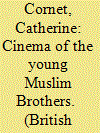

|
|
|
|
|
| Summary/Abstract |
This article examines Islamist engagement with popular culture in Egypt, focusing on Ikhwān Cinema a cultural intervention launched by a youth group affiliated with the Muslim Brotherhood, following the election of Mohamed Morsi as president in June 2012. Until now, scholars have tended to ignore Islamist-produced popular culture, reflecting assumptions that Islamists are opposed to popular culture, and even culture more broadly. Yet, as this article explores, the Muslim Brotherhood has historically viewed culture as an important vehicle through which to disseminate their ideas and to attract people to the organization. The first part of the article reviews the historical position of the Muslim Brotherhood towards the arts and cinema in order to put Ikhwān Cinema into context. The second part examines the aesthetic content of Ikhwān Cinema’s video productions, specifically created for social media consumption. The third part analyses how the group continued these aesthetics following the toppling of their political leader in July 2013. Overall, the article argues that we can understand Ikhwān Cinema both as a continuation of the Muslim Brotherhood’s historical engagement with culture as well as a case of a post-Islamist trend that seeks to blend Islam with elements of global youth culture.
|
|
|
|
|
|
|
|
|
|
|
|
|
|
|
|
| 2 |
ID:
178541
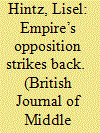

|
|
|
|
|
| Summary/Abstract |
In the early morning of September 6, 2019, two rap videos expressing frustrations with Turkey’s socio-political condition coincidentally dropped together and quickly went viral. Although one was more overtly political, both videos crystalized the rage, grief, and hopelessness many had been feeling under the 17-year rule of the Justice and Development Party (AKP). The dual release catalyzed a groundswell of online mobilization at a particularly tumultuous moment – one at which mass protest in the form of organized street demonstrations was effectively off the table. As this article argues, however, pushback against the AKP was alive and well in alternative spaces. From rap collaborations challenging corruption and rising rates of femicide to social media users repurposing familiar memes of TV shows with witty political critique, pop culture-themed acts of resistance signalled to others in Turkey’s fractious opposition that they were not alone. This articles addresses an interdisciplinary body of literature that examines the AKP’s deployment of entertainment media to extend its soft power abroad and cultivate a conservative society at home, but turns it around to explore how various opposition actors strike back by taking pop culture into their own hands as a tool of expression, mobilization, and subversion.
|
|
|
|
|
|
|
|
|
|
|
|
|
|
|
|
| 3 |
ID:
178546
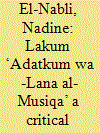

|
|
|
|
|
| Summary/Abstract |
In this article, I explore how the Lebanese band, Mashrou` Leila, enacts resistance, negotiations and subversions through their lyrical and musical outputs, drawing on notions of ‘disidentification’ and ‘creative reckoning’. Through their music, I engage with questions of how marginalized bodies and citizens creatively negotiate and resist hegemonic identity configurations and notions of belonging. To that end, I conduct a close reading of the band’s musical lyrics, contextualize them and analyse their implications politically, socially and emotionally, illustrating the complex process of negotiating various layers of imposed identities and political interests. I particularly focus on their use and (re)imagining of history, language, and pop culture references. I argue that through their creative reckoning with hegemonic notions of belonging and identity, the band creates cultural spaces that enable the (re)imagining of identities, particularly with regards to gender and sexual identities.
|
|
|
|
|
|
|
|
|
|
|
|
|
|
|
|
| 4 |
ID:
178547


|
|
|
|
|
| Summary/Abstract |
The article focuses on the emergence and development of the Tunisian protest song (in Arabic al-ughniya al-multazima) in the late Bourguiba period, and investigates its role in the education, mobilization and galvanization of students, unionists and activists. An analysis of song lyrics and oral testimonies reveals the influence of Gramsci’s ideas on Tunisian leftist artists and intellectuals, who adapted concepts such as, cultural hegemony and common-sense to the local context. Furthermore, the article discusses the significance of the ‘popular’ in relation to these activists’ cultural project. Despite being mainly confined to intellectual and political circles, protest songs made wide use of peasant symbolism, rural imagery and the everyday experiences of workers, revealing the ideological project of the Left, which aspired to assert cultural hegemony over the masses. In the first part of the article I will trace the historical and political background in which this musical scene emerged. In the second and third parts I will engage, respectively, in an analysis of songs by the musical groups al-Bahth al-Musiqi from Gabes and Awlad al-Manajim from Moularès. By tracing the history of the Tunisian protest song, the article sheds light on the production of resistant cultural material under authoritarian regimes.
|
|
|
|
|
|
|
|
|
|
|
|
|
|
|
|
| 5 |
ID:
178540
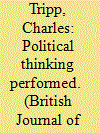

|
|
|
|
|
| Summary/Abstract |
This contribution develops three major lines of argument. Firstly, it argues that identifying ‘popular culture’ is not simply a definitional exercise but is also purposeful and performative. Secondly, it contends that ‘popular cultures’ are always implicated in power relations in multiple ways. Finally, it maintains that using a performative lens adds to our understanding of the political dimensions of ‘popular cultures’. Taking examples chiefly from the Middle East and North Africa, it avers that studying ‘popular cultures’ highlights the links between the political and the performative, understood both as acting out (theatrical) and as bringing into being (effective). The term ‘culture(s) of the public(s)’ is used to capture the idea of the public as a plurality of active citizens, distinct from the politically charged term ‘the people’. These publics claim space as their right, experiencing agonistic encounters with the different generations, genders, classes, ethnicities that use their own repertoires to assert their claims. Thus, the cultures of the plural public can help to fashion the public self as citizen, but for that same reason can also provoke ferocious repression from those who feel most threatened by such a development.
|
|
|
|
|
|
|
|
|
|
|
|
|
|
|
|
| 6 |
ID:
178542


|
|
|
|
|
| Summary/Abstract |
This article analyzes a popular Mubarak era film series (al-Limby) and a post-uprising satirical television programme (al-Bernameg) to show how humour has a powerful capacity to create nonsense out of the ‘sense’ that authoritarian regimes attempt to impose on society. In the Mubarak years, such films presented criticism of rising economic inequalities and state oppression. Post-2011 uprising satire similarly became a primary site for criticism of state oppression and regime politics. They were examples of a redistribution of the nonsensical (drawing on Rancière) and gradual creative insurgency (drawing on Kraidy). Yet at the same time, even seemingly revolutionary humour can reproduce hegemonic ‘common sense’ that upholds broader social hierarchies, particularly those related to gender, class, and religion. Thus, this article argues that humour can be critical to both revolutionary and counter-revolutionary sense-making.
|
|
|
|
|
|
|
|
|
|
|
|
|
|
|
|
| 7 |
ID:
178544


|
|
|
|
|
| Summary/Abstract |
This article analyses the interaction between MyKali, the first LGBTQ webzine/platform in Jordan, and mainstream Jordanian media and society. It explores the moral panics occurring over the 11 years of Mykali’s trajectory, and analyses the webzine’s attempts to resist these panics and articulate its agenda through pop-activism. From inception to censorship, the trajectory of MyKali illustrates the limits of freedom of expression and the articulation of non-heterosexual identities, as well as the role of media panics in enforcing social control in Jordan. This paper is comprised of four main parts: the first introduces MyKali as a queer counterpublic. The second presents the theoretical framework I draw on and the key concepts used in the analysis. The third part presents what I term the discourse of ‘homophobic authenticity’ and its role in the moral panics surrounding MyKali. Finally, in the fourth part I analyse MyKali’s use of pop-activism to stake its claim to Jordanian identity and counter the discourse of homophobic authenticity through a comparative study of two of its most iconic cover images.
|
|
|
|
|
|
|
|
|
|
|
|
|
|
|
|
| 8 |
ID:
178545


|
|
|
|
|
| Summary/Abstract |
Palestinian popular music is usually researched through two fram eworks: as folkloric identity or resistance to Israeli occupation. This paper stretches beyond these theoretical straitjackets. Based on two-years of qualitative fieldwork in Ramallah and Haifa, it explores how DJs and partygoers negotiate ‘everyday’ power through popular culture. It argues that dancefloors create semi-public spaces where young adults rehearse unconventional identities. Dress and dance assert femininities, masculinities, and queer subjectivities centred on pleasure, joy, and fun. Audience spaces are important sites of identity formation and negotiation. However, since such subjectivities are forged through consumption, youth require money (for clothes, tickets, time) to participate. Undoing gender and sexuality codes therefore relies on class-based hierarchies. Tracing identity embodiments on dancefloors reveal neither dissent nor acquiescence to hegemonic controls. Rather, as class structures cement, gender and sexuality modes shift (which instantiates novel controls). While scholarship tends to link music to resistance in Palestine, gender performances on dancefloors yield nuanced insights into power, play, and social (re)imagination. This, I argue, underscores the pressing need to approach popular culture in MENA and elsewhere beyond the now overdetermined resistance/compliance binary.
|
|
|
|
|
|
|
|
|
|
|
|
|
|
|
|
| 9 |
ID:
178548
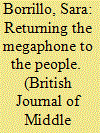

|
|
|
|
|
| Summary/Abstract |
‘We return the megaphone to the people’. This is how the activist Hosni al-Mukhlis describes the aim of the Theater of the Oppressed group that he founded in Casablanca in 2012. He was one of the main leaders of the 20 February Movement in 2011 and today he is involved in what he defines as 'a new social and political pedagogy through art’. Based on interviews and participant observation with Moroccan activists, this article focuses on the Theater of the Oppressed group as an example of the wave of socio-political activism involving artistic practices that emerged after the Arab uprisings in some MENA countries. The paper situates this artivism within the context of political disenchantment and social exclusion experienced in the wake of the failure of the 20 February Movement vis à vis the Moroccan authoritarian politics. The article argues that the Theater of the Oppressed can be interpreted as artivism that generates political transformations, opens critical spaces in the public sphere and promotes emancipatory trajectories for those involved in its mobilizing projects, in functioning as political praxis pursuing a renewed proximity between activists and ordinary people, as well as the creation of a new collective imagination and a critical citizenry.
|
|
|
|
|
|
|
|
|
|
|
|
|
|
|
|
|
|
|
|
|